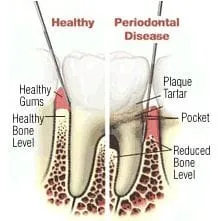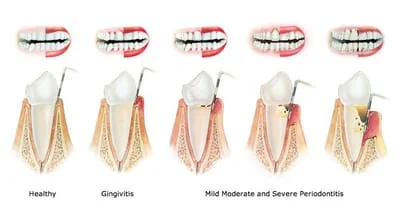What Causes Periodontal Disease?
Periodontal disease begins with simple dental plaque that hasn’t been effectively cleaned from teeth. 
Swollen and bleeding gums are an early sign of periodontal disease. Eventually, plaque will spread below the gumline, where it’s difficult to remove. When your gums swell, a space is formed between the gums and teeth, encouraging more bacteria to grow. If left untreated, periodontal disease can cause teeth to become loose and eventually destroy the supporting structures of the teeth.
Stages of Periodontal Disease
The progression of periodontal disease begins with swelling and bleeding at the gumline, known as gum disease or gingivitis. This first step in the progression of periodontal disease is generally reversible with professional teeth cleanings and consistent dental care at home.
If left untreated, gingivitis can lead to a condition called periodontitis. The plaque that gathers along the gumline hardens into a substance called tartar or calculus. This accumulation causes gums to pull away from the teeth, forming “pockets” where food particles and bacteria gather. The supporting gum tissue and bone become infected and are eventually destroyed, leading to pain, discomfort and tooth loss. T
The most common cause of periodontal disease is inadequate dental care. An at-home regimen of thorough brushing and flossing is required for both the prevention and treatment of periodontal disease, as well as regular professional cleanings.
Treatment of Periodontal Disease
Even those who take meticulous care of their teeth can experience periodontal disease. Certain people are more susceptible to this condition, including diabetics, tobacco users, and those who clench or grind their teeth.
Regardless of the cause, it’s imperative to seek treatment as soon as possible to prevent the progression of periodontal disease. The central goal of treating periodontal disease is to remove all disease-causing bacteria and regenerate the supporting structures of your teeth. The extent of the periodontal treatment prescribed will depend on the progression of periodontal disease present. I'On Family Dentistry provides a variety of treatment options for those dealing with periodontal disease.